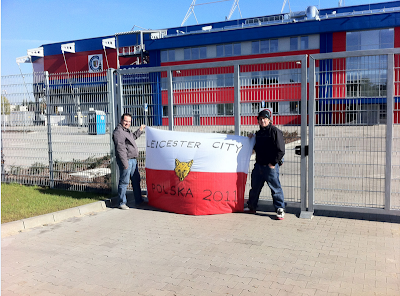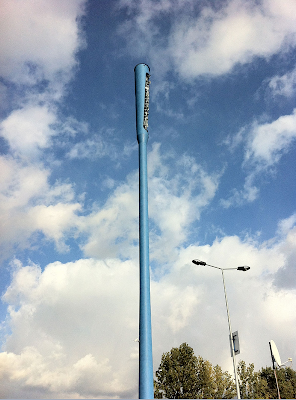Cool for Katowice
All aboard Ryan Hubbard's Polish Football Express. Fasten up as Hubbard takes us to Wisla Krakow via a whole host of other Polish football grounds on the ultimate Polish EFW....
When choosing the destination for my first ever European Football Weekend, the decision-making process lasted for all of around 4 seconds.
"Lads, how about a jaunt to Poland this October? A handful of games, even more stadia and ridiculously cheap beers?"
"No problem Ryan!"
"Good. Then we're off to Katowice!"
Katowice is in the south of the country, not too far from the border with the Czech Republic. The city is the capital of the Upper Silesian Metropolitan area (Gorny Sląsk) - Poland's equivalent of Manchester and its surrounding towns. And with six clubs in the top two-flights within a 30-minute train ride, and the city of Krakow just over an hour away by bus, the chances are it was a great place to get a couple of games in.
Within a couple of hours in the country, Gareth, Bridgie (my fellow EFWers) and myself had our first stadium already tucked under the belt. A trip on the tram and a £3 taxi ride brought us outside of the Stadion Ruchu, home of 14-time champions of Poland Ruch Chorzow, to pick up fan-cards and tickets for their game on Sunday.
Tall, thin and blue Central European floodlight photo? Tick!
Fan cards are now a requirement in Poland for Ekstraklasa games. In a clampdown on hooliganism ahead of the Euro 2012 competition next summer, fans are now required to register their details with the club in order to buy tickets. When the supporter arrives at the stadium, they are then required to scan their cards to gain entry.

After leaving with our 5 Zloty ID cards and 25 Zloty tickets (a total of six quid for a top-flight game), a trip back to Katowice and their German-themed 'Bierhalle' restaurant for a couple of litres of beer and pretzel (at £3 a time) saw out the rest of the evening.
With no games on the agenda for Friday, sightseeing was the order of the day. An early start was required for a sobering trip to the nearby former Nazi Concentration Camp of Auschwitz, before heading back to Gorny Sląsk to visit two more of the local stadia.

Stadion GKS Katowice
With time pressing on and darkness closing in, it was decided that GKS Katowice should be the first of the day's two grounds as the club shop closed at 5pm and everyone was keen to grab some souvenirs. After grabbing a yellow-and-black home shirt for myself, and a couple of green away jerseys for Gareth and Bridgie (as well as free GKS Katowice pens thrown in for good measure), a 30-minute walk through the Silesian Culture and Recreation Park brought us to the former home of the national team, the Stadion Sląski.
Before its redevelopment, the Sląski held over 50 Polish International games as well as numerous cup finals and European club games. During Manchester United's 1968 European Cup win, the Stadium hosted the Red Devils' Quarter Final with Gornik Zabrze. Over 90,000 crammed into the Sląski to see a Wlodzimierz Lubanski goal inflict Matt Busby's only defeat on the way to lifting the trophy.

Stadion Śląski
Now halfway through its redevelopment, the Sląski is already looking like an impressive structure. And if it wasn't for the late start of construction and the following numerous delays, there is no doubt it would have made an excellent Euro 2012 stadium. But even now, the mooted completion time of April looks unlikely. With the area still looking like a massive building site and the harsh Central European winter closing in, it looks like it'll be ready in the summer at the earliest. After pondering the stadium's purpose following the building of the new Narodowy Stadion in Warsaw, we headed back to sup a few jars of Tyskie and watch the Podbeskidzie - Cracovia game on TV; before calling it an early(ish) night.
Crack On, Krakow
Wisla Krakow 3-1 Jagiellonia Bialystok (15:10:2011)
Waking up at 7:30 to catch a bus to take a 70km bus ride is something that doesn't usually fill me with excitement. But when the destination is Krakow, and the reason for travelling is to see some Polish Ekstraklasa football, for some reason it makes it very easy.
Both of the top-flight clubs in Krakow, along with many other clubs in the country, have recently had massive stadium upgrades. Cracovia have redeveloped their decrepit old ground with a modern 16,000 seater which manages to put many Premier League grounds to shame; whilst the city's bigger club Wisla (although it's probably best not to say that out loud when walking through Rynek Glowny), have also rebuilt their home in the past few years. The Henryk Reyman Stadion has gotten rid of the old grass banks, and is now a stadium fit to host European football - and actually did, when Wisla played Fulham just 5 days later. And it was Wisla's home which was to be our first stop of the day, where we were to pick up our fan cards and tickets for that evening's game.

After parting with 25 Zloty for the match ticket, and 10 Zloty for the ID Card (£5 and £2 respectively), we were soon on our way across the city's Park Blonia to visit the second stadium of the day - the Stadion Cracovii, home of Wisla's arch-rivals Cracovia. And with a bar inside which looks out into the stadium, it would have been very rude of us not to take a goosey around.

Stadion Cracovii

A bite to eat and a few beverages overlooking Pasy's pitch later, and it was off for a short sightseeing trip in Krakow. We took in Wawel Castle, the Market Square, Hard Rock Café, and the very turgid Liverpool versus Man United game in the company of some Scouse/Polish fans who only were able to repeatedly churn out the "Steve Gerrard" chant in broken English. But after the final whistle, it was finally time to head back to the Henryk Reyman for the Ekstraklasa action which we were all craving.

Jagiellonia Bialystok were the visitors to Poland's second city and, after scanning our ID Cards and having the obligatory searches conducted, we arrived into our seats in time for a minute's silence for a Jagiellonia supporter who had fallen from a train whilst making the 250-mile trip from near to the Belarussian border. As a result, only 20-or-so Jaga fans had made it in time for the start.
When the game kicked off, it didn't take long for us to realise that earlier in the morning when we had asked the lovely young Polish lady in the ticket office for tickets "Away from the Ultras", allowing us to observe them and take photographs; she had quite clearly misunderstood and placed us smack in the middle of the C-Sektor - where Wisla's most vocal and active supporters reside.
Wisla's C-Sektor
Cue a first half filled with plenty of action in the North Stand, whilst the football on the pitch failed to match the intensity of the support. Whilst the Wisla ultras sang in support of their friends at Lechia Gdansk and Sląsk Wroclaw, Israeli striker Dudu Biton came closest to breaking the deadlock, somehow firing over the Jagiellonia bar from just a few yards.
Obviously riled up by the quality of food available in the concourses at half-time (seriously Wisla, the wrap was soggy, the chicken bland - 2/10 at best), both sides came out of the blocks in the second half. And when 18-year old Jan Pawlowski slotted past Wisla keeper Sergei Pareiko, the Jagiellonia fans (who had swelled in size after the late arrival of the earlier mentioned train) were sent into raptures.
Although the home support never stopped chanting, they were keen to show their disappointment in the Wisla performance by performing a stadium-wide "Grecque" (It's not a fecking "Poznan"!!!) turning their backs to the game for 30 seconds; before turning to face the action and continuing to pound up and down. The Wisla fans were eventually rewarded with 10 minutes left, when the ball hit Dudu Biton on the leg and looped into the air. Dutch defender Kew Jailens then proceeded to challenge the Jagiellonia keeper in mid-air (some would say unfairly; the rest are either blind or Wisla fans), and the ball somehow was bundled into the net. Protests all around from the Jaga players fell on deaf ears, and eventually resulted in a yellow card being dished out to one defender. But all the Wisla supporters cared about was that the goal stood. One-all, game on...
Just seven minutes later, Lukasz Gargula's cross was met perfectly by the head of Andraz Kirm; and when the effort was saved superbly by Jagiellonia keeper Tomasz Ptak, Bulgarian substitute Tzvetan Genkov was on hand to rifle the ball into the net from 5 yards.
Before the Wisla faithful had even finished celebrating Genkov's strike, Slovenian midfielder Kirm received the ball 40-odd yards from goal and proceeded to smash the ball past the helpless Jagiellonia defence and into the bottom corner.
As the final whistle sounded in the Henryk Reyman Stadion, the crowds' singing continued. Ringing out the club's "anthem", the support patiently waited for the Wisla players to head in front of the C-Sektor before, at the top of their voices chanting "Jazda, Jazda, Jazda" (roughly translated as "Go, go, go"), to which the fans reply "Biala Gwiazda" ("White Star"). The sequence is then reversed, before the mad rush out of the ground begins.
Wisla fans singing with the Players
With the Wisla scarf now tucked safely out of sight, our long walk to catch the last bus to Katowice proved difficult. It wasn't until the return home until the bruises from the red plastic seats were noticed, but the experience was definitely worth it.

Sląski, Bloody Sląski
"Trzy bilety do Gliwice proszę."
"Dziękuje."
With the majority of my Polish knowledge exhausted at Katowice Train Station (well, the stuff that's repeatable on these pages anyway), we were soon on our way to Gliwice; birthplace of - among others you've probably never heard of - Lukas Podolski, and home of I Liga club Piast. With a population of around 200,000 (maybe they had all buggered off when we popped in), the city is apparently twinned with Doncaster, although it doesn't seem to claim that out aloud.
Over the past year-or-so, Piast have been waiting for their new 10,500-capacity stadium to be built; and now finished, the club will move in to it over the next few weeks.

Stadion Piast

After a quick nosey around the exterior of the stadium (quick summary: it looks amazing considering it's made from Lego), we had half an hour to get to the neighbouring city of Zabrze in time for kick-off in our first game of the day. Our task was made even more difficult as we emerged onto the main road with no taxi in sight.
After a ten minute walk, five minute bus-ride back into Gliwice city centre, and a further 15-minute and ?16 taxi ride later, we finally entered Gornik Zabrze's Stadion Ernesta Pohla, just as the referee blew the starting whistle....
To be continued........
Follow Ryan Hubbard and European Football Weekends on Twitter
Ryan is the Editor of Modern Football and Los Revolucionarios


No comments:
Post a Comment